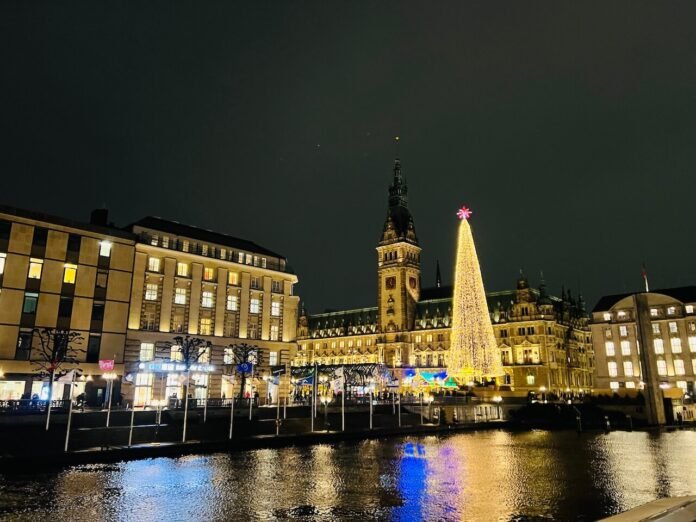Hamburg for expats: Discover everything about living, working, and thriving as an expat in Hamburg.
Hamburg, Germany’s second-largest city, is a hub of culture, history, and opportunity. Located in the northern part of the country, Hamburg offers a high standard of living, a thriving job market, and a welcoming environment for expats. Whether you’re moving for work, study, or adventure, this guide will help you easily navigate life in Hamburg.
Cost of Living in Hamburg for Expats
Hamburg is one of Germany’s most expensive cities but remains more affordable than European hubs like London or Paris. The cost of living varies based on lifestyle, location, and housing preferences. While rent is the biggest expense, other daily costs, such as groceries and transport, are relatively moderate.
- Rent: €1,200 – €2,500 per month for a one-bedroom apartment, depending on the district
- Groceries: Around €250–€350 per person per month, based on shopping habits
- Public Transport: A monthly HVV pass costs around €89, with discounts for students and employees
- Healthcare: Public health insurance (GKV) starts at around €160 per month, while private insurance (PKV) varies
- Entertainment & Dining:
- Restaurants: €10–€20 for a casual meal; fine dining starts at €40+ per person
- Cinema tickets: Around €12, with discounts on special days
- Fitness membership: €30–€70 per month, depending on the gym
While housing and dining out can be pricey, public transport, healthcare, and entertainment remain relatively affordable. Expats can reduce costs by choosing less central districts, shopping at discount supermarkets, and using bike-sharing or public transport instead of owning a car.

Best Neighborhoods for Expats
- Eimsbüttel: Family-friendly, great cafes, good schools
- Altona: Trendy, young professionals, waterfront views
- St. Pauli: Vibrant nightlife, multicultural
- HafenCity: Modern, upscale living, luxury apartments
- Winterhude: Green spaces, peaceful, family-friendly
Finding Accommodation
Finding a home in Hamburg for expats can be challenging due to high demand.
- Use platforms like Immobilienscout24, WG-Gesucht, or Ebay Kleinanzeigen
- Expect to provide proof of income and SCHUFA credit report
- Consider shared apartments (WGs) for lower costs
Visa & Residency
You’ll need a visa if you’re moving from outside the EU. The most common visas include:
- Job Seeker Visa (valid for six months)
- Blue Card for Highly Skilled Workers
- Student Visa
- Freelancer Visa
After arrival, register your address at the Bürgeramt within two weeks.
Working in Hamburg

Hamburg is one of Germany’s strongest economic hubs, offering diverse job opportunities across logistics, maritime trade, aviation, media, and technology industries. As a major port city, Hamburg is home to global companies like Airbus, Beiersdorf, Otto Group, and many shipping firms, making it an attractive destination for professionals. The city also has a thriving start-up scene, particularly in fintech, gaming, and green energy, supported by co-working spaces and innovation centers. With its strong economy, Hamburg provides excellent career prospects for locals and expats.
The work culture in Hamburg is professional yet balanced, with a standard 40-hour workweek and strong labor protections. Employees benefit from competitive salaries, paid vacation (usually 25–30 days per year), and social security coverage. Non-German speakers can find opportunities in multinational companies and English-speaking jobs, particularly IT, research, and tourism. However, learning German improves job prospects significantly. Hamburg also has a well-connected public transport system, making commuting to work convenient. The city’s business-friendly environment and high quality of life make it one of the best places in Germany for career growth.
- Top industries: Maritime, Media, Tech, Renewable Energy
- Average salary: €50,000 – €70,000 per year
- Networking tips: Join LinkedIn groups, attend meetups, and visit the Hamburg Chamber of Commerce
- Public holidays in Hamburg: Hamburg observes several national and regional holidays, providing opportunities for relaxation and cultural experiences.
Education System
Hamburg has a well-structured education system that follows the German model but with unique aspects tailored to the city’s needs. Schooling is compulsory for children aged 6 to 16, with four years of primary education (Grundschule). After this, students choose from different secondary school options, including Gymnasium, Stadtteilschule, and vocational schools. The Gymnasium prepares students for university with the Abitur diploma, while Stadtteilschule offers a more flexible curriculum with different graduation options. Hamburg also has a strong vocational education (Berufsschule) system, where students combine classroom learning with practical training in companies.
The city has several prestigious higher education institutions, including Universität Hamburg, Hamburg University of Technology (TUHH), and HafenCity University, offering various academic and research programs. Private and international schools, such as the International School of Hamburg, also provide English-language instruction, catering to expatriate families. Hamburg strongly emphasises digital education, sustainability, and research, making it a hub for students seeking modern and innovative learning opportunities.
Healthcare System
Hamburg has a well-developed healthcare system offering high-quality medical services through a network of public and private hospitals, clinics, and specialized medical centers. The city is home to top-tier hospitals like Universitätsklinikum Hamburg-Eppendorf (UKE), one of the leading university hospitals in Europe, providing advanced medical research and specialized treatments. Other major hospitals, such as Asklepios Kliniken and Marienkrankenhaus, ensure comprehensive healthcare services across various districts. Residents in Hamburg benefit from a dense network of general practitioners (Hausärzte), specialists, and emergency medical services, ensuring easy access to medical care.
Healthcare in Hamburg operates under Germany’s dual insurance system, where most residents are covered by statutory health insurance (GKV) while others opt for private health insurance (PKV). The city also has well-equipped pharmacies (Apotheken) that provide prescription and over-the-counter medications, with many offering 24-hour emergency services. Additionally, Hamburg strongly focuses on preventive healthcare, with numerous wellness centers, rehabilitation clinics, and mental health facilities. Expats and international residents can find English-speaking doctors in private practices and specialized international medical centers, making healthcare more accessible for non-German speakers.
Transportation in Hamburg
Hamburg has a well-connected and efficient public transportation system, managed by the Hamburger Verkehrsverbund (HVV). The city’s network includes U-Bahn (subway), S-Bahn (commuter trains), buses, and ferries, making it easy to get around without a car. The U-Bahn and S-Bahn cover the city and surrounding areas, operating frequently, even late at night. Buses provide extensive coverage, with night buses (Nachtbus) running after midnight. Ferries on the Elbe River, part of the public transport system, offer scenic and convenient travel across the waterfront.
Hamburg is a bike-friendly city for cyclists, with dedicated lanes and bike-sharing services like StadtRAD. Car-sharing and ride-hailing services such as ShareNow, Sixt Share, and Uber are also available. Hamburg Hauptbahnhof (central station) connects to major German and European cities via Deutsche Bahn (DB) high-speed trains for long-distance travel. Hamburg Airport (HAM) offers domestic and international flights, making the city highly accessible. With its efficient and eco-friendly transport options, Hamburg provides a smooth commuting experience for residents and visitors.
Cultural Insights

Hamburg hosts several vibrant festivals, including the famous Hamburger Dom, a large funfair held three times a year, and the Hafengeburtstag, celebrating the city’s port anniversary with grand parades and fireworks. A firm handshake is the standard greeting when interacting with locals, reflecting Germany’s formal business culture. Punctuality is highly valued in all aspects of life, so being on time for appointments and social gatherings is a sign of respect.
Food & Dining
Hamburg offers a rich culinary experience with its famous local dishes, such as Fischbrötchen and Labskaus. The city boasts some of the best restaurants, including Bullerei and Fischereihafen Restaurant, which serve top-quality seafood and regional specialties. Additionally, the diverse food scene includes Turkish, Vietnamese, and Italian cuisine, ensuring a variety of flavors for every taste.
Entertainment & Nightlife
Hamburg’s nightlife thrives in the Reeperbahn, famous for its vibrant bars and clubs. The city also offers rich cultural experiences at Elbphilharmonie and Thalia Theater. For families, attractions such as Miniatur Wunderland and Hagenbeck Zoo provide enjoyable entertainment for all ages.
Day Trips & Getaways
- Lüneburg: Historic town, great for a day visit
- Lübeck: UNESCO-listed medieval city
- Baltic Sea & North Sea: Great beaches nearby
FAQs
1. Is Hamburg expensive for expats?
Yes, but it’s more affordable than cities like London or Paris.
2. Can I live in Hamburg without speaking German?
Yes, but learning German will make life easier.
3. What’s the best way to find a job in Hamburg?
Use LinkedIn, job portals like Stepstone, and networking events.
4. Is public transport reliable in Hamburg?
Yes, Hamburg’s HVV system is well-connected and efficient.
5. How do I find an English-speaking doctor?
Use Doctolib.de or check with your insurance provider.
6. What is the weather like in Hamburg?
Mild summers (20-25°C) and cold, rainy winters (0-5°C).
Conclusion
Hamburg is an excellent city for expats, offering a high quality of life, a strong economy, and a welcoming community. With the right preparation, you can settle in smoothly and enjoy everything this dynamic city has to offer.

